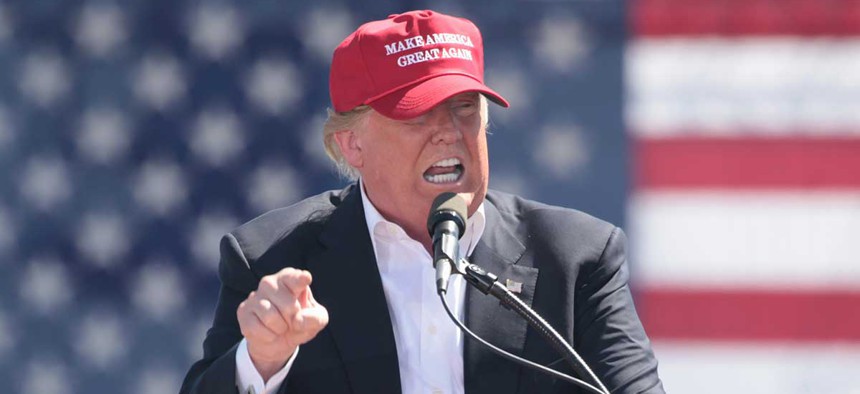
Flickr user Gage Skidmore
Poll: Voters Are Backing Anti-Muslim Proposals
Measures floated by Ted Cruz and Donald Trump garnered strong backing in a post-Brussels survey.
If Donald Trump needed another poll to reinforce his bluster, he might’ve just gotten it.
A new survey from Morning Consult, conducted in the wake of the Brussels bombings, details voter sentiment on national-security policies, including support for Trump’s prohibition on Muslims entering the United States. Trump—a poll obsessive—may tout the percentage of voters backing his idea as proof he knows what the country needs.
He wouldn’t be alone in making that argument: A proposal from rival Ted Cruz to increase police presence in Muslim neighborhoods saw similarly high support, and Trump himself said just days ago he’d “100 percent” support Cruz’s plans. What neither candidate might care to dig into, though, is how sincere that support is—whether voters would back these plans in practice, or whether they were searching for something, anything, to prevent a Brussels-style attack in the United States.
Brussels was certainly on the mind of the voters surveyed. Morning Consult’s poll—comprised of more than 2,000 registered voters and with a margin of error of 2 points—began just two days after the attacks. Eighty-one percent said they’d seen, heard, or read of the bombings “a lot” or “some.” Overall, 38 percent of those polled self-identified as Democrats, with independents and Republicans at 31 percent and 32 percent, respectively.
Responses to the survey’s very first question provided some early evidence that voters were feeling unsteady; 71 percent of those polled said “things in the country” have “pretty seriously … gotten off on the wrong track”—a figure that’s higher than a RealClearPolitics average of similar questions found in past polls. Wrong-track sentiment is particularly—and unsurprisingly—high among GOP supporters.
The voters also seem to believe the U.S. is on the wrong track when it comes to the government’s handling of Muslims, both at home and abroad. Trump has advocated for months now for a short-term ban on Muslims crossing U.S. borders, “until our country’s representatives can figure out what is going on.” Ted Cruz spoke of the “need to empower law enforcement to patrol and secure Muslim neighborhoods before they become radicalized.” Both plans have their healthy share of critics, who deride religious tests as antithetical to American values, and question both their efficacy and constitutionality. But both plans nevertheless drew major support in the post-Brussels poll: 50 percent for Trump’s plan and 49 percent for Cruz’s. Trump’s proposal saw similar support in a December Morning Consult poll. He first proposed the ban in early December after the San Bernardino, California, shootings.
upport for the anti-Muslim proposals climbs significantly among those candidates’ most ardent supporters. Trump’s backers are particularly enthusiastic. Eighty-four percent of Trump voters support his temporary travel ban, in contrast with the 65 percent of Cruz voters who back it. Cruz’s plan for enhanced patrols, which he proposed post-Brussels last week, saw more support among Trump voters (79 percent) than among his own supporters (68 percent). Both plans drew support from across the ideological spectrum: 35 percent of Democrats and 46 percent of independents backed Cruz’s; Trump’s plan was attractive to 34 percent of Democrats and 49 percent of independents.
On both those hot-button survey questions, supporters of Ohio Governor John Kasich look more like Hillary Clinton voters than their fellow GOPers. Both Kasich and Clinton have personally come out against the Trump and Cruz proposals. The results also dovetail with Kasich’s positioning of himself as a more moderate candidate with potential bipartisan appeal. As recently as Sunday,Kasich suggested such proposals were “knee-jerk” and would unnecessarily alienate the Muslim community. Clinton’s rhetoric has been even stronger; in anational security-focused speech last week, she called Cruz’s proposal “dangerous” and rejected Trump’s entirely.
Kasich and Clinton can perhaps take heart that this poll happened in the post-Brussels haze. Perhaps voters expressed more enthusiasm for anti-Muslim measures because they felt, temporarily, so unsafe. But if it instead suggests a hardening of public sentiment, reinforced by every terror attack, it presents a challenge not just to Kasich and Clinton—but to America’s commitment to religious pluralism.
(Image via Flickr user Gage Skidmore)
NEXT STORY: Play of the Day: Bernie Sanders and His Bird







